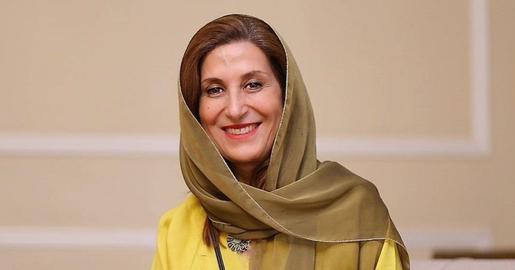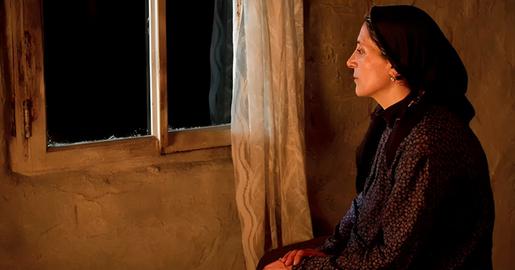SEPTEMBER 26, 2023
IRANWIRE

Whether playing a timid, provincial or rebellious woman, a wealthy aristocrat or a university professor, Fatemeh Motamed-Arya’s acting is powerful and convincing

Fatemeh Motamed-Arya has strongly influenced Iranian cinema since the 1980s

Whether playing a timid, provincial or rebellious woman, a wealthy aristocrat or a university professor, her acting is powerful and convincing to the point one could assume she was playing herself. With her chameleon-like ability to play so many different characters, Fatemeh Motamed-Arya has strongly influenced Iranian cinema since the 1980s.
Fatemeh (Simin) Motamed-Arya was born in Tehran in October 1961 and began acting when she was 20 years old. Later, she completed a theater degree at Tehran School of the Arts and took courses in drama and filmmaking at the Institute for the Intellectual Development of Children and Young Adults. This institution, founded by Queen Farah the same year Motamed-Arya was born, was one of the most successful centers for artistic education.
After the 1979 Islamic Revolution, Fatemeh Motamed-Arya became a puppeteer for a popular children’s television show called The Mice School. Just a few years later, she began playing leading roles in a number of films.
Throughout her career, she has won numerous Iranian and international acting awards. In 2011, she received the Best Actress Award at Montréal Film Festival for her role in Here Without Me, an Iranian film that was inspired by The Glass Menagerie by Tennessee Williams. The next year, she won the Prix Henri-Langlois at the Vincennes International Festival in France for her lifetime endeavors in promoting cinema.
However, show business has not been her only passion. Over the past 10 years, Fatemeh Motamed-Arya has played an active role in philanthropy. This has involved setting up charity fairs for children with cancer and collecting money for those who can’t afford education.
In June 2015, her portrait was displayed alongside 15 international figures at a multimedia exhibition called The Transformative Power of Art in New York. The exhibition showcased artists that have worked to support human rights or to aid humanity.
During the runup to the disputed 2009 presidential election in Iran, Motamed-Arya helped promote gender equality in a video for reformist candidate Mir Hossein Mousavi. This led to sharp criticism from hardliners. Fars News Agency, which is affiliated to the Revolutionary Guards, published an open letter condemning her support for Mousavi and accusing her of insulting the Iranian people.
The letter also mentioned a video that featured Motamed-Arya and several other actresses dancing at a party without the hijab in the early 1990s. She was banned for a short period of time because of it. The ban was reinstated because of her support for Mousavi during the election, with hardliners accusing her of being a “seditionist.”
Then, in autumn 2009, a few months after the presidential election, the American Academy of Motion Pictures invited Fatemeh Motamed-Arya to the US. Iranian authorities seized her passport at the airport and she was banned from leaving the country.
A year later, the ban was lifted and she was able to appear at the Cannes film festival. However, hardliners again condemned her after photographs emerged showing her at the festival without a hijab. She was banned once again from acting. The ban was then extended further when hardliners discovered that the presenter of the Henri-Langlois Award her kissed her during the awards ceremonies.
Soon after, she was summoned to the prosecutor’s office at Evin Prison for visiting the family of Sohrab Aarabi, a young man killed during the protests that followed the 2009 presidential election and for speeches she had given in support of Mousavi. As punishment, she was ordered to pay a fine.
When Rouhani was elected president in 2013, things improved for Fatemeh Motamed-Arya. The ban was rescinded and two of her films were shown at Iran’s most important film event, the Fajr Film Festival.
Fatemeh Motamed-Arya has been a favorite target of Islamic Republic’s hardliners, especially when it comes to mandatory hijab. Nevertheless, she is held in high regard by Iran’s art community. In February 2019, at the inauguration of the 37th Fajr Film Festival in Tehran, a special ceremony was held to honor her and her work.
Despite all the obstacles and difficulties she faced during her career, she continued to view Iranian cinema with optimism. “Our national cinema has proven that it grows and resists despite all obstacles,” she said in an interview. “We should help to protect and cherish it since it has been the most progressive art reflecting people’s struggles and hopes since the revolution.”
And despite her experience throughout her career, she has not bent to the misogynic ideology of the Islamic Republic. In October 2022, at the height of the 2022 nationwide protests sparked by the death in police custody of Mahsa Amini, Fatemeh Motamed-Arya appeared on a social media video without a hijab to show her anger at the suppression of protesters.
"In a country where they kill young freedom-seeking people and little girls, I'm not considered a woman," she wept in a clip that went viral. "I am a mother. I am Mahsa’s mother. Sarina's mother. I am the mother of all those children who’ve been killed in this country, not a woman amongst murderers!” she added.
In early May 2023, Tehran police said a legal case had been filed against Motamed-Arya for "putting down the hijab in public and publishing images on social media." And in June, the Islamic Republic’s security agencies prevented Fatemeh Motamed-Arya from traveling to Austria to participate in an art festival because she had declared her solidarity with the “Woman, Life, Freedom” movement.
Fatemeh Motamed Aria is married to screenwriter Ahmad-Ali Hamed. They have a son together.
No comments:
Post a Comment